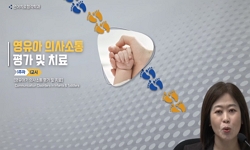본 연구의 결과를 토대로 살펴볼 때 다음과 같은 결론을 내릴 수 있다. 첫째, 교사의 연령, 경력에 따른 부모-교사 간 의사소통의 어려움 정도에 의미 있는 차이가 있다. 부모와의 의사소통에...
http://chineseinput.net/에서 pinyin(병음)방식으로 중국어를 변환할 수 있습니다.
변환된 중국어를 복사하여 사용하시면 됩니다.
- 中文 을 입력하시려면 zhongwen을 입력하시고 space를누르시면됩니다.
- 北京 을 입력하시려면 beijing을 입력하시고 space를 누르시면 됩니다.
유아교사가 지각하는 부모-교사 간 의사소통의 어려움에 대한 연구 = A Study on the Difficulties with Parent-Teacher Communication Perceived by Kindergarten Teachers
한글로보기https://www.riss.kr/link?id=T11681529
- 저자
-
발행사항
부산 : 부산대학교, 2009
- 학위논문사항
-
발행연도
2009
-
작성언어
한국어
- 주제어
-
발행국(도시)
부산
-
형태사항
iv, 99 p. ; 26cm
- DOI식별코드
- 소장기관
-
0
상세조회 -
0
다운로드
부가정보
첫째, 교사의 연령, 경력에 따른 부모-교사 간 의사소통의 어려움 정도에 의미 있는 차이가 있다. 부모와의 의사소통에 있어 연령과 경력이 낮은 교사들은 부모와의 관계에 대한 문제해결능력과 부모에 대한 교감능력의 미숙함으로 인해 어려움을 겪지만 차츰 연령과 경력이 증가함에 따라 부모에 대한 이해의 폭이 커지고 부모를 대하는 태도나 기술이 향상되어 좀 더 편안하게 부모를 대할 수 있으며 문제 상황에서도 여유 있게 대처하며 부모들의 다양한 특성에 맞춰 보다 유연해지는 모습을 보인다.
둘째, 교사가 지각하는 부모-교사 간 의사소통의 어려움 정도에 교사의 대인간 의사소통 수준이 유의한 영향을 미친다. 교사의 대인간 의사소통능력이 부모와의 의사소통에서도 힘을 발휘하므로 교사의 대인간 의사소통 능력과 기술을 향상시키기 위한 교사 교육 프로그램이 마련되어야 할 것이다. 이를 통해 부모-교사 간 의사소통에서 나타나게 될 문제에 적절하게 대처하고 부모와 교사의 동반자적 협력관계의 토대를 구축할 수 있다.
셋째, 유아교육기관의 유형에 따른 부모-교사 간 의사소통의 어려움 정도에 의미 있는 차이가 있다. 국·공립 유아교육기관에 비해 사립 유아교육기관이 제도적으로, 행정적으로 교사에 대한 지원이 미비하고 부모와의 의사소통 기회와 여건이 부족한 실정이며 교육자로서의 권위가 덜 인정되고 있음이 커다란 어려움으로 나타났다. 이는 교사의 개인적인 노력으로 해결될 수 없는 것이므로 이를 위한 효율적인 부모-교사 간 의사소통 지원방안이 이루어질 수 있는 환경적이고 제도적인 기반이 형성되어야 할 것이다.
이상의 연구 결론을 중심으로 부모-교사 간 의사소통에 관한 후속 연구에 대하여 몇 가지 제언을 하면 다음과 같다.
첫째, 본 연구는 유아교사가 지각하는 부모-교사 간 의사소통의 어려움을 알아보기 위해 설문지와 척도를 통한 조사연구를 실시하였으나 질적인 사례연구, 면접, 관찰과 같은 여러 가지 방법들을 복합적으로 사용하여 심층적인 연구를 할 필요가 있다.
둘째, 유아교사가 지각하는 부모-교사 간 의사소통의 어려움에 대한 이해를 바탕으로 부모와 교사 간의 균형을 통한 상호협력적인 의사소통 프로그램에 대한 개발 연구가 이루어져야 할 필요가 있다.
셋째, 유아교사가 지각하는 부모-교사 간 의사소통의 어려움에 대해 교사의 연령, 학력, 경력, 대인간 의사소통 수준과 같은 교사 변인 이외에 교사의 직무 만족도, 교사의 자기 효능감, 교직 태도 등과 같은 교사의 교직 관련 심리적 변인에 따른 차이를 연구할 필요가 있다.
본 연구의 결과를 토대로 살펴볼 때 다음과 같은 결론을 내릴 수 있다.
첫째, 교사의 연령, 경력에 따른 부모-교사 간 의사소통의 어려움 정도에 의미 있는 차이가 있다. 부모와의 의사소통에 있어 연령과 경력이 낮은 교사들은 부모와의 관계에 대한 문제해결능력과 부모에 대한 교감능력의 미숙함으로 인해 어려움을 겪지만 차츰 연령과 경력이 증가함에 따라 부모에 대한 이해의 폭이 커지고 부모를 대하는 태도나 기술이 향상되어 좀 더 편안하게 부모를 대할 수 있으며 문제 상황에서도 여유 있게 대처하며 부모들의 다양한 특성에 맞춰 보다 유연해지는 모습을 보인다.
둘째, 교사가 지각하는 부모-교사 간 의사소통의 어려움 정도에 교사의 대인간 의사소통 수준이 유의한 영향을 미친다. 교사의 대인간 의사소통능력이 부모와의 의사소통에서도 힘을 발휘하므로 교사의 대인간 의사소통 능력과 기술을 향상시키기 위한 교사 교육 프로그램이 마련되어야 할 것이다. 이를 통해 부모-교사 간 의사소통에서 나타나게 될 문제에 적절하게 대처하고 부모와 교사의 동반자적 협력관계의 토대를 구축할 수 있다.
셋째, 유아교육기관의 유형에 따른 부모-교사 간 의사소통의 어려움 정도에 의미 있는 차이가 있다. 국·공립 유아교육기관에 비해 사립 유아교육기관이 제도적으로, 행정적으로 교사에 대한 지원이 미비하고 부모와의 의사소통 기회와 여건이 부족한 실정이며 교육자로서의 권위가 덜 인정되고 있음이 커다란 어려움으로 나타났다. 이는 교사의 개인적인 노력으로 해결될 수 없는 것이므로 이를 위한 효율적인 부모-교사 간 의사소통 지원방안이 이루어질 수 있는 환경적이고 제도적인 기반이 형성되어야 할 것이다.
이상의 연구 결론을 중심으로 부모-교사 간 의사소통에 관한 후속 연구에 대하여 몇 가지 제언을 하면 다음과 같다.
첫째, 본 연구는 유아교사가 지각하는 부모-교사 간 의사소통의 어려움을 알아보기 위해 설문지와 척도를 통한 조사연구를 실시하였으나 질적인 사례연구, 면접, 관찰과 같은 여러 가지 방법들을 복합적으로 사용하여 심층적인 연구를 할 필요가 있다.
둘째, 유아교사가 지각하는 부모-교사 간 의사소통의 어려움에 대한 이해를 바탕으로 부모와 교사 간의 균형을 통한 상호협력적인 의사소통 프로그램에 대한 개발 연구가 이루어져야 할 필요가 있다.
셋째, 유아교사가 지각하는 부모-교사 간 의사소통의 어려움에 대해 교사의 연령, 학력, 경력, 대인간 의사소통 수준과 같은 교사 변인 이외에 교사의 직무 만족도, 교사의 자기 효능감, 교직 태도 등과 같은 교사의 교직 관련 심리적 변인에 따른 차이를 연구할 필요가 있다.
다국어 초록 (Multilingual Abstract)

The study questions for the purpose of the study were as follows:
1) What kind of difficulty is perceived by kindergarten teachers with parent-teacher communication according to the types of early childhood educational institutions?
2) Is there any difference in the difficulty with parent-teacher communication perceived by kindergarten teachers according to the variables of teachers(age, academic background, career, interpersonal communication level)?
3) Is there any difference in the difficulty with parent-teacher communication perceived by kindergarten teachers according to the variables of early childhood educational institutions(types, size, the age of young children, and number of children in a class)?
For the purpose, this researcher sent research questions to 200 teachers who are working in public and private kindergartens and nurseries located Busan. The returned questions were 196 and 192 returned questions used except for no respond questions. The collected data were tatistically analyzed by SPSS 14.0. The data were analyzed using the following methods: Frequency analysis, Cross-tabulation analysis, x²-test, ANOVA, Scheffe post-test and t-test.
The conclusions, derived from the major findings of this study were as follows:
First, there were significant differences in the degree of difficulty with parent-teacher communication perceived by the kindergarten teachers according to their age and career. Those teachers with a young age and a short career experienced difficulties with communication with the parents due to lack of problem solving skills in relation to the parents and poor ability to sympathize with them. As their age and career grew older, however, they deepened their understanding of the parents, sharpened their attitudes and skills to deal with them, became more comfortable to deal with them, adopted more leisurely ways to take care of problematic situations, and grew more flexible to accommodate the diverse characteristics of the parents.
Secondly, the teachers' interpersonal communication levels had significant impacts on their perceived difficulties with parent-teacher communication. Since their interpersonal communication skills affect their communication with the parents, they should have access to teacher training programs designed to help improve their interpersonal communication abilities and skills. Such programs can further help them properly deal with potential problems with parent-teacher communication and set up a foundation for their partnership and cooperation with the parents.
Finally, there were significant differences in the difficulties with parent-teacher communication according to the types of early childhood educational institutions. The teachers working for a private early childhood educational institution receive poorer institutional and administrative support, have fewer opportunities and conditions to communicate with the parents, and experience less approval of their authority than their counterparts in a national or public early childhood educational institution. As a result, they are faced with enormous difficulty, which cannot be solved by their individual efforts. Therefore, there should be environmental and institutional foundations to provide them with supports to promote efficient parent-teacher communication.
This study set out to understand the difficulties with parent-teacher communication perceived by kindergarten teachers, analyze differences in the difficulties according to the variables of teachers and early childhood educational institutions, and se...
This study set out to understand the difficulties with parent-teacher communication perceived by kindergarten teachers, analyze differences in the difficulties according to the variables of teachers and early childhood educational institutions, and search for efficient communication plans to increase the quality of parent-teacher relationships in early childhood educational institutions.
The study questions for the purpose of the study were as follows:
1) What kind of difficulty is perceived by kindergarten teachers with parent-teacher communication according to the types of early childhood educational institutions?
2) Is there any difference in the difficulty with parent-teacher communication perceived by kindergarten teachers according to the variables of teachers(age, academic background, career, interpersonal communication level)?
3) Is there any difference in the difficulty with parent-teacher communication perceived by kindergarten teachers according to the variables of early childhood educational institutions(types, size, the age of young children, and number of children in a class)?
For the purpose, this researcher sent research questions to 200 teachers who are working in public and private kindergartens and nurseries located Busan. The returned questions were 196 and 192 returned questions used except for no respond questions. The collected data were tatistically analyzed by SPSS 14.0. The data were analyzed using the following methods: Frequency analysis, Cross-tabulation analysis, x²-test, ANOVA, Scheffe post-test and t-test.
The conclusions, derived from the major findings of this study were as follows:
First, there were significant differences in the degree of difficulty with parent-teacher communication perceived by the kindergarten teachers according to their age and career. Those teachers with a young age and a short career experienced difficulties with communication with the parents due to lack of problem solving skills in relation to the parents and poor ability to sympathize with them. As their age and career grew older, however, they deepened their understanding of the parents, sharpened their attitudes and skills to deal with them, became more comfortable to deal with them, adopted more leisurely ways to take care of problematic situations, and grew more flexible to accommodate the diverse characteristics of the parents.
Secondly, the teachers' interpersonal communication levels had significant impacts on their perceived difficulties with parent-teacher communication. Since their interpersonal communication skills affect their communication with the parents, they should have access to teacher training programs designed to help improve their interpersonal communication abilities and skills. Such programs can further help them properly deal with potential problems with parent-teacher communication and set up a foundation for their partnership and cooperation with the parents.
Finally, there were significant differences in the difficulties with parent-teacher communication according to the types of early childhood educational institutions. The teachers working for a private early childhood educational institution receive poorer institutional and administrative support, have fewer opportunities and conditions to communicate with the parents, and experience less approval of their authority than their counterparts in a national or public early childhood educational institution. As a result, they are faced with enormous difficulty, which cannot be solved by their individual efforts. Therefore, there should be environmental and institutional foundations to provide them with supports to promote efficient parent-teacher communication.
목차 (Table of Contents)
- Ⅰ. 서론 = 1
- 1. 연구의 필요성 및 목적 = 1
- 2. 연구문제 = 5
- 3. 용어의 정의 = 6
- Ⅱ. 이론적 배경 = 7
- Ⅰ. 서론 = 1
- 1. 연구의 필요성 및 목적 = 1
- 2. 연구문제 = 5
- 3. 용어의 정의 = 6
- Ⅱ. 이론적 배경 = 7
- 1. 가정과 유아교육기관의 연계 = 7
- 2. 유아교육기관에서의 의사소통과 인간관계 = 12
- 3. 부모-교사 간 의사소통의 어려움과 영향 요인 = 22
- Ⅲ. 연구 방법 = 33
- 1. 연구 대상 = 33
- 2. 연구 도구 = 35
- 3. 연구 절차 = 38
- 4. 자료 분석 = 39
- Ⅳ. 연구 결과 = 40
- 1. 유아교육기관 유형별 교사가 지각하는 부모-교사 간 의사소통과 그 어려움 = 40
- 2. 교사 변인에 따른 부모-교사 간 의사소통의 어려움 = 54
- 3. 유아교육기관 변인에 따른 부모-교사 간 의사소통의 어려움 = 60
- Ⅴ. 논의 및 결론 = 65
- 1. 논의 = 65
- 2. 결론 및 제언 = 77
- 참고문헌 = 80
- 부록 = 88
- Abstract = 97












